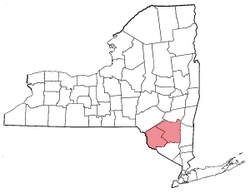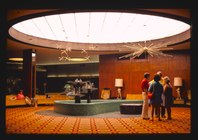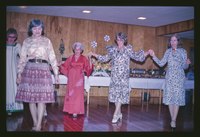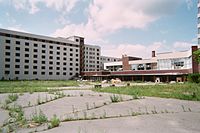Borscht Belt
This article includes a list of general references, but it remains largely unverified because it lacks sufficient corresponding inline citations. (June 2020) |
Borscht Belt | |
|---|---|
Cultural region of the United States | |
 Areas of upstate New York that constituted the Borscht Belt | |
| Country | |
| State | |
Borscht Belt, or Jewish Alps, is a colloquial term for the mostly defunct summer resorts of the Catskill Mountains in parts of Sullivan, Orange and Ulster counties in upstate New York, United States. A source interviewed by Time magazine stated that the visits to the area by Jewish families was already underway "as early as the 1890s ... Tannersville ... was 'a great resort of our Israelite breathren'...from the 1920s on [there were] hundreds of hotels".[1]
A 2019 review of the history is more specific: "in its heyday, as many as 500 resorts catered to guests of various incomes".[2] These resorts, but also the bungalow colonies, were a popular vacation spot for New York City Jews from the 1920s through the 1960s.[3] By the late 1950s, many began closing, with most gone by the 1970s, but some major resorts continued to operate, a few into the 1990s. Grossinger's Catskill Resort Hotel closed in 1986[4] and the Concord Resort Hotel struggled to stay open until 1998.[5]
Name[]
The word comes from borscht, a soup of Ukrainian origin, made with beetroot as the main ingredient giving it a deep reddish-purple color,[6] that is popular in many Central and Eastern European countries and brought by Ashkenazi Jewish and Slavic immigrants to the United States. The name is a play on existing colloquial names for other American regions (e.g. the Bible Belt, the Rust Belt, etc.).
History[]
In the 1920s and into the 1930s, some hotels and resorts' advertisements refused to accept Jews and indicated "No Hebrews or Consumptives" in their ads. This issue led to a need for alternatives that would readily accept Jewish families as guests. One report states that the larger hotels provided "Friday night and holiday services as well as kosher cooking".[7][8]
At the hotels, "food was of primary importance ... there was a sense that ‘too much was not enough'", according to one source.[9] “To understand the emphasis on food,” writes Johnathan Sarna, "one has to understand hunger. Immigrants had memories of hunger, and in the Catskills, the food seemed limitless".[10]
The singles scene was also important; many hotels hired young male college students[11] to attract the single girls of a similar age. One book about the era said that the Catskills "became one great marriage broker".[12]
Borscht Belt hotels, bungalow colonies, summer camps, and kuchaleyns (a Yiddish name for self-catered boarding houses) flourished. The bungalows usually included "a kitchen/living room/dinette, one bedroom, and a screened porch" with entertainment being simple: bingo or a movie.[13] The kuchaleyns were also visited often by middle and working-class Jewish New Yorkers. Because of the many Jewish guests, this area was nicknamed the Jewish Alps and "Solomon County" (a modification of Sullivan County) by many people who visited there.[14]
Resorts of the area included , Brown's, The Concord, Grossinger's, Granit, the Heiden Hotel, Irvington, Kutsher's Hotel and Country Club, the Nevele, , , The Pines Resort, Raleigh, the Overlook, the Tamarack Lodge, Stevensville, Stier's Hotel and the Windsor. Some of these hotels originated from farms that were established by immigrant Jews in the early part of the 20th century.[15]
Two of the larger hotels in High View (just north of Bloomingburg) were Shawanga Lodge and the Overlook. One of the high points of Shawanga Lodge's existence came in 1959 when it was the site of a conference of scientists researching laser beams. The conference marked the start of serious research into lasers.[16] The hotel burned to the ground in 1973.[17]
The Overlook, which offered entertainment and rooms, as well as bungalows, was operated by the Schrier family.[18]
The Granit Hotel and Country Club, located in Kerhonkson, boasted many amenities, including a golf course. It closed in 2015, and was renovated and turned into the Hudson Valley Spa, which closed in 2018. The property was sold in May 2019 to Hudson Valley Holding Co. LLC. The company did not announce its plans for the hotel.[19]

Brown's hotel, 1977

A view from the Granit hotel, 1977

The Nevele hotel lobby, 1978

A room at Kutcher's, 1977

The Concord dining room, 1978

Brickman's pool area, 1977

Grossinger's ping pong, 1977

Folk dancing party at Menges' Lakeside, 1977
Decline[]
According to Time, "the Borscht Belt resorts reached their peak in the 1950s and 60s, accommodating up to 150,000 guests a year" but the start of a decline was apparent by the late 1960s. "Railways began cutting service to the area, the popularity of air travel increased, and a younger generation of Jewish-Americans chose other leisure destinations."[20] Another source mentions a secondary factor: "anti-Semitism declined, so Jews could go other places".[21]
Access to the area improved with the upgrade of old travel routes such as old New York State Route 17. On the other hand, passenger train access ended with the September 10, 1953 termination of passenger trains on the Ontario and Western Railway mainline from Roscoe at the northern edge of Sullivan County, through the Borscht Belt, to Weehawken, New Jersey.[22] The area suffered as a travel destination in the late 1950s and especially by the '60s. Another source also confirms that "cheap air travel suddenly allowed a new generation to visit more exotic and warmer destinations".[23]
According to a recent source, by the early 1960s, some 25 to 30 per cent of Grossinger's visitors were not Jewish.[24]
A Times of Israel article specifies that "the bungalow colonies were the first to go under, followed by the smaller hotels. The glitziest ones hung on the longest" with some continuing to operate in the 1980s and even in the 1990s.[25] The Concord, which outlasted most other resorts, went bankrupt in 1997 but survived until 1998.[26]
In 1987, New York's mayor Ed Koch proposed buying the Gibber Hotel in Kiamesha Lake to house the homeless. The idea was opposed by local officials.[27] The hotel instead became the religious school Yeshiva Viznitz.[28]
21st century[]
The Heiden Hotel in South Fallsburg, which was the location of the movie Sweet Lorraine starring Maureen Stapleton, was destroyed by fire in May 2008.[29]
The Stevensville Hotel in Swan Lake, owned by the family of accused Bernard Madoff accomplice David G. Friehling, reopened as the Swan Lake Resort Hotel.[30]
The former Homowack Lodge in Phillipsport was converted into a summer camp for Hasidic girls. Officials of the state Department of Health ordered the property evacuated in July 2009, citing health and safety violations.[31]
Many Buddhist and Hindu retreat centers have been constructed on the land or in the restored buildings of former camps or resorts to serve adherents in New York City, the establishment of which has then drawn even more temples and centers to the area. This led to the coining of the nickname 'Buddha Belt', 'Bhajan Belt', or 'Buddhist Belt' to refer to the areas revival.[32][33][34]
After 2016[]
An October 2017 report provided a brief history and update about ten abandoned resorts, listed below, as well as a recent photo of each.[35] A March 2020 report from the same source discussed a book about the region, "The Borscht Belt: Revisiting the Remains of America’s Jewish Vacationland" by Marisa Scheinfeld, a Visiting Assistant Professor of Photography at SUNY Purchase.[36][37] In 2018, another site published more of Scheinfeld's photos of the "crumbling" remains of several popular resorts.[38]
- Grossinger's Catskill Resort Hotel; this complex was demolished in 2018 and a new owner planned to build a hotel, homes and other amenities.[39]
- Lesser Lodge
- Nevele Grand Hotel
- The Vegetarian Hotel
- Kutsher's Hotel and Country Club; a wellness club was built on the site; it opened in June 2018.[40][41]
- Pines Hotel
- White Lake Mansion House
- Homowack Lodge
- Tamarack Lodge
- Concord Resort Hotel; In February 2018, Resorts World Catskills opened on the site of the old hotel.
- Abandoned hotel buildings

The Concord hotel, 2005

Kutcher's hotel, 2015

Grossinger's resort, 2015

The Granit resort, 2015
Comedic legacy[]

The tradition of Borscht Belt entertainment started in the early 20th century with the indoor and outdoor theaters constructed on a 40-acre (16-hectare) tract in Hunter, New York by Yiddish theater star Boris Thomashefsky.[citation needed]
A cradle of American Jewish comedy since the 1920s, the Borscht Belt entertainment circuit has helped launch the careers of many famous comedians and acted as a launchpad for those just starting out.[42]
Comedians who got their start or regularly performed in Borscht Belt resorts include:
This section does not cite any sources. (June 2020) |
- Joey Adams
- Woody Allen
- Morey Amsterdam
- Sandy Baron
- Benny Bell
- Milton Berle
- Shelley Berman
- Mel Brooks
- Lenny Bruce
- George Burns
- Red Buttons
- Sid Caesar
- Jean Carroll
- Jack Carter
- Myron Cohen
- Bill Dana
- Rodney Dangerfield
- Phyllis Diller
- Totie Fields
- Betty Garrett
- Estelle Getty
- George Gobel
- Shecky Greene
- Buddy Hackett
- Mickey Katz
- Danny Kaye
- Alan King
- Robert Klein
- Jack E. Leonard
- Pesach Burstein
- Sam Levenson
- Jerry Lewis
- Jackie Mason
- Lou Menchell
- Jan Murray
- Carl Reiner
- Don Rickles
- Joan Rivers
- Freddie Roman
- Allan Sherman
- Jackie Vernon
- Jonathan Winters
- Henny Youngman
Borscht Belt humor refers to the rapid-fire, often self-deprecating style common to many of these performers and writers. Typical themes include:[citation needed]
- Bad luck
- Puns: "Sire, the peasants are revolting!" "You said it. They stink on ice." (Harvey Korman as Count de Money (Monet) and Mel Brooks as King Louis XVI, in History of the World Part I)
- Physical complaints and ailments (often relating to bowels and cramping): "My doctor said I was in terrible shape. I told him, 'I want a second opinion.' He said, 'All right, you're ugly too!'" "I told my doctor, 'This morning when I got up and saw myself in the mirror, I looked awful! What's wrong with me?' He replied, 'I don't know, but your eyesight is perfect!'" (Dangerfield)
- Aggravating relatives and nagging wives: "My wife and I were happy for twenty years. Then we met." (Dangerfield). "Take my wife—please!" (Henny Youngman); "My wife drowned in the pool because she was wearing so much jewelry." (Rickles); "My wife ain't too bright. One day our car got stolen. I said to her, 'Did you get a look at the guy?' She said, 'No, but I got the license number.'" (Dangerfield) "This morning the doorbell rang. I said 'Who is it?' He said 'It's the Boston Strangler.' I said 'It's for you dear!'" (Youngman)
Popular culture[]
This section does not cite any sources. (June 2020) |
These resorts have been the setting for movies such as Dirty Dancing (Kutsher's), , and A Walk on the Moon.
Characters inspired by Borscht Belt comics include Billy Crystal's Buddy Young Jr. from Mr. Saturday Night and Robert Smigel's Triumph, the Insult Comic Dog.
Frank Oz, who is of Polish Jewish descent, modeled Fozzie Bear on Borscht Belt comics.
In the 1960 film Murder, Inc., Walter Sage (Morey Amsterdam) is shown performing at the fictional Ribbon Lodge in the Catskills.
In the 1976 film The Front, set in 1953, comedian Hecky Brown (Zero Mostel), harassed by HUAC, has an ill-fated gig in the Catskills.
In the film Sleepers, a poster for Sonny Liston is seen on the wall of Robert De Niro's apartment and shows in Fallsburg, New York as the location of the fight. The scene is when they are talking about the defense of the trial and De Niro's talk to Jason Patric and Minnie Driver.
In the Season 3 episode of the 1990s live-action sitcom Sabrina the Teenage Witch, "Sabrina's Real World", Hilda Spellman accidentally puts on a literal, magical "borscht belt" that causes her to tell stand-up jokes non-stop and won't come off until she's told one million jokes.
In the online game Mobsters, A Borscht Belt Comedian is a henchmen needed for a mission involving taking over a Catskill Resort.
The early-20th-century Jewish experience of vacationing in the Catskills was recounted in the graphic short story "Cookalein" by Will Eisner. The story appears in Eisner's collection A Contract with God.
The novel Marjorie Morningstar was about the same era and locale, but the corresponding film was made in the Adirondacks rather than the Catskills.
Several episodes of Season 2 of The Marvelous Mrs. Maisel are set in the Catskills and depict Catskill resort living in detail.
See also[]
References[]
- ^ The Real History Behind The Marvelous Mrs. Maisel’s Trip to the Catskills ‘Borscht Belt’
- ^ Hotel History: Catskill Mountain Resort Hotels
- ^ "Jewish scholars study history, cultural significance of the Borscht Belt" (Press release). Providence, Rhose Island: Brown University. Archived from the original on December 3, 2019.
- ^ Ruins of Grossinger's Resort
- ^ Hotel History: Catskill Mountain Resort Hotels
- ^ Schultze, Sydney (2000). Culture and Customs of Russia. Series: Cultures and Customs of the World. Greenwood. pp. 65–66. ISBN 978-0313311017.
The very poor might have few vegetables in the soup other than cabbage, making it shchi, or if it also had beets it was considered borscht. Borscht, actually Ukrainian in origin....
- ^ Spotlight on Nostalgia
- ^ Kutsher’s Documentary Captures Eclectic Legacy Of Borscht Belt Relic
- ^ September 25, 2018
- ^ The Catskills: Its History and How It Changed America, page 303
- ^ Remembering Summers and Honeymoons in the Mountains
- ^ Catskill Hotels, page 9
- ^ Borscht Belt staff reminisce about the glory days of the Jewish Alps and their part in making it happen
- ^ [https://books.google.ca/books?id=qH0eT_cpkywC&pg=PA160&lpg=PA160&dq=borscht+belt++Jewish+%5B%5BAlps%5D%5D+and+%22Solomon+County%22&source=bl&ots=RLOOYXqOfu&sig=ACfU3U1CL0-wfm9pe4i52b1gMjbN_qmaMg&hl=en&sa=X&ved=2ahUKEwiIpbqE1qnvAhULca0KHdsFCoYQ6AEwF3oECCEQAw#v=onepage&q=borscht%20belt%20%20Jewish%20%5B%5BAlps%5D%5D%20and%20%22Solomon%20County%22&f=false Did Jew Know?: A Handy Primer on the Customs, Culture & Practice of the Chosen People, page 160]
- ^ Finkelstein, Norman H. (2014-01-01). Jewish Comedy Stars: Classic to Cutting Edge. Kar-Ben Publishing ™. ISBN 978-1-5124-9029-9.
- ^ Hecht, Jeff (2005). Beam: the race to make the laser. Oxford University Press. p. 101. ISBN 9780195142105.
- ^ "Mamakating" by Monika A. Roosa, Arcadia Publishing, 2007, p. 29
- ^ Hotel History: Catskill Mountain Resort Hotels
- ^ Hudson Valley Resort and Spa, closed since October 2018, bought by Brooklyn group Mat 7, 2019
- ^ The Disappearance of the Borscht Belt Hotels
- ^ History of Borscht Belt Hotels and Bungalow Colonies in the Catskills
- ^ American Rails, 'New York, Ontario and Western Railway' https://www.american-rails.com/nyow.html
- ^ 23 eerie photos that show the crumbling beauty of New York's abandoned 'Borscht Belt' resorts
- ^ Hotel History: Catskill Mountain Resort Hotels
- ^ The Bygone Era of the Jewish Catskills Resorts
- ^ Hotel History: Catskill Mountain Resort Hotels
- ^ Purnick, Joyce (1987-04-04). "Catskills Hotel Suggested For Homeless". The New York Times. Retrieved 2010-04-26.
- ^ "Hotels and Bungalows". Providence, Rhode Island: The Catskills Institute, Brown University. Archived from the original on January 30, 2019. Retrieved June 28, 2020.
- ^ "Overnight Fire Destroys Heiden Hotel of 'Sweet Lorraine' fame". Times Herald-Record. Middletown, New York. May 18, 2008. Archived from the original on September 1, 2019. Retrieved June 28, 2020.
- ^ Israel, Steve (March 22, 2009). "Madoff mess has local link". Times Herald-Record. Middletown, New York. Archived from the original on September 1, 2019. Retrieved 2010-06-09.
- ^ Whitman, Victor (2009-07-16). "New York wants sect to leave old resort". Times Herald Record. Middletown, New York. Archived from the original on June 28, 2020. Retrieved 2009-07-17.
- ^ "HAVENS; The 'Bhajan Belt': Serenity in the Catskills". The New York Times. 2002-10-18. Retrieved 2020-09-24.
- ^ Sullivan, John (2007-08-19). "region's 'buddha belt' keeps on expanding". recordonline.com. Retrieved 2020-09-24.
- ^ Brown, Rande (2015-12-29). "Borscht Belt Buddhism". Tricycle: The Buddhist Review. Retrieved 2020-09-24.
- ^ 10 Abandoned Resorts from the Borscht Belt, America’s Jewish Vacationland in Catskills, New York
- ^ Explore Abandoned Resorts of the Borscht Belt
- ^ [The Borscht Belt: Revisiting the Remains of America's Jewish Vacationland by Marisa Scheinfeld (review) https://muse.jhu.edu/article/713010/pdf Project MUSE. Produced by Johns Hopkins University Press]
- ^ 23 eerie photos that show the crumbling beauty of New York's abandoned 'Borscht Belt' resorts
- ^ Possible revival of Grossinger’s Resort moves ahead
- ^ High-end wellness resort opens in Sullivan County
- ^ YO1 Luxury Nature Cure
- ^ "Yada Yada Yada: 15 Greatest Moments in Jewish Comedy History". Tel Aviv, Israel: Museum of the Jewish People at Beit Hatfutsot. December 18, 2018. Archived from the original on June 28, 2020.
External links[]
- The Catskills Institute, Brown University. Archived from the original on December 2, 2019.
- Van Ells, Mark D. (Spring 2007). "The Rise and Fall of the Borscht Belt (Review)". Film & History. Center for the Study of Film and History. 37 (1): 80. doi:10.1353/flm.2007.0011. S2CID 201796384. Archived from the original on June 3, 2018.
- Documentary about a bungalow colony of Holocaust survivors in the Catskills
- Borscht Belt
- Jewish comedy and humor
- Catskills
- Orange County, New York
- Sullivan County, New York
- Economy of Ulster County, New York
- History of Ulster County, New York
- Jewish theatre











